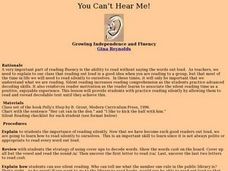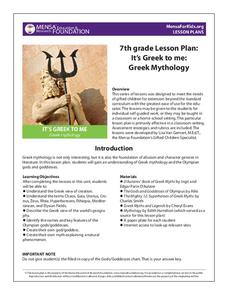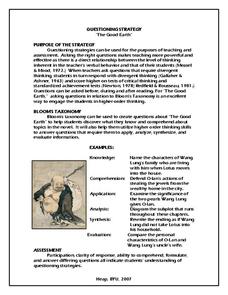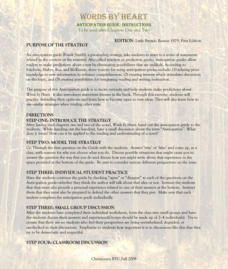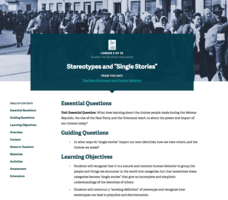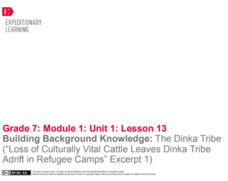Curated OER
Brog-Cube-the Spam
A Middle school special ed class uses the acronym SPAM to learn the 4 parts of writing. They employ 4 different colors to help them visually distinguish each part of writing in a given prompt. This lesson plan is vague and uses a strong...
Curated OER
You Can't Hear Me!
Teach the skill of reading silently through modeling. The teacher demonstrate how to read silently and also gives instructions on decoding skills. Individuals then read silently using the book Polly's Shop . The teacher...
Curated OER
Express Yourself
How do you make a story exciting? Teach young readers how to change your pitch, tone, and mood as you read. After modeling the various ways you can change your expression, have small pairs or groups work together to give it a shot!
MENSA Education & Research Foundation
It’s Greek to Me: Greek Mythology
It's no myth: this packet on Greek mythology is an excellent addition to your social studies curriculum. With writing activities, such as short answer responses and biopoems, and reading activities, which include creation stories and...
Maine Content Literacy Project
Introduction to John Updike
Expand your pupils' understanding of the short story genre with a study of John Updike and his story "A&P." This lesson, the fourth in a series of fourteen, invites learners to examine literary terms and read and discuss the story....
Maine Content Literacy Project
Introduction to Short Story Writers Say
There are so many authors of short stories, and your class can have the chance to study quite a few. This seventh lesson plan in a series of fourteen continues the decision-making process for the final assessment: a short story author...
Novelinks
The Good Earth: Questioning Strategy
Readers use Bloom's Taxonomy to create multi-level questions about Pearl Buck's The Good Earth.
Novelinks
Words By Heart: Anticipation Guide
The anticipation guide for Words by Heart is the first of a series of six, contains lesson plans for the activity as well as a handout to be completed individually, in pairs, or as a class. It sparks interest for the text...
Curated OER
Getting Down to Business
Three lesson plans are shown on this site, two of which pertain to Read 180. Start the year with the first lesson plan by having your learners create a brochure about themselves. In the computer lab, they find clip art and photos to make...
Stanford University
Letter from Birmingham Jail: The Power of Nonviolent Direct Action
What strategies are most effective in changing an unjust law? Class members examine the tactics used in the Birmingham Campaign of 1963 (Project C) to achieve social justice and social transformation. After examining documents that...
Prestwick House
Vocabulary in Context: Inside the World of Wizards
Enter the world of Harry Potter and learn new vocabulary at the same time. A high-interest reading passage provides insight into the history of Harry Potter. Follow-up activities incorporate key vocabulary strategies, such as using...
EngageNY
Building Background Knowledge: The Lost Boys of Sudan
Get deep! Teach scholars how to make connections between texts to deepen their understanding of a topic. Using the resource, pupils read and annotate a short informational text about Sudan's Civil War and refugee crisis. Next, they...
Facing History and Ourselves
Stereotypes and “Single Stories”
Help bring subconscious stereotypes to the surface to stop it in its tracks. Pupils first read an excerpt describing the experience of prejudice and analyze how this process connects to World War II. Then, they write a creative story...
National Woman's History Museum
Defying British Rule: Women's Contributions to The American Revolution
Primary and secondary sources are the focus of a lesson that showcases the important role women played during the American Revolution. Pairs review sources and discuss their findings. A close-reading of an informational text leads the...
EngageNY
Building Background Knowledge: The Dinka Tribe (“Loss of Culturally Vital Cattle Leaves Dinka Tribe Adrift in Refugee Camps” Excerpt 1)
Text annotations help readers track essential ideas. Pupils continue reading and annotating an informational article about Sudanese tribes, connecting it with A Long Walk to Water by Linda Sue Park. They also begin writing about their...
EngageNY
Paraphrasing and Evaluating Sources: Pages 112–116 of The Big Thirst
Agriculture and water—it's a fine balance. So how exactly do industry and agriculture currently manage water? Pupils consider the question as they continue reading excerpts from Charles Fishman's The Big Thirst and adding notes to their...
EngageNY
Analyzing Interaction: Categories of Water Management in The Big Thirst
It's puzzle time! Pupils participate in a jigsaw activity to discuss the various uses of water, including personal, agricultural, and industrial uses. They also conduct a close reading of The Big Thirst by Charles Fishman and answer...
EngageNY
Identifying Theme: Connecting Passages from Esperanza Rising to Human Rights
Even fictional characters have rights. Scholars read selected passages from Pam Muñoz Ryan's Esperanza Rising and consider which of the five categories from the Universal Declaration of Human Rights the text relates to. They glue each...
EngageNY
Summarizing Informational Text: “Hawaii’s Endangered Happy Face Spider”
Put on a happy face. Using an interesting resource, pupils read an informational text about Hawaii's endangered Happy Face Spider. Next, they participate in a jigsaw discussion to find the gist of the article.
EngageNY
Paraphrasing Quotes and Analyzing Visual Elements, Part 2: Investigating the Scientific Method with Max Axiom Super Scientist
Solve the world's problems. Class members move on to section two of Investigating the Scientific Methods with Max Axiom Super Scientist and complete a similar activity as in the previous lesson. Next, they carry out a first read to...
EngageNY
Identifying Author’s Opinion and Evidence: The Value of Sports in People’s Lives, Part I
Just like instant replay, it's time to take a closer look! Pupils work together to add ideas to a Close Readers Do These Things anchor chart. They then put their knowledge to the test as they read an informational article about the...
EngageNY
Paraphrasing Quotes and Analyzing Visual Elements, Part 4: Investigating the Scientific Method with Max Axiom Super Scientist
Problem solved! Readers continue their work on determining gist and paraphrasing problem-solving steps by reading section four of Investigating the Scientific Method with Max Axiom Super Scientist. Learners complete a graphic organizer...
WE Charity
High School–Module 2: Circular Economy and Nature
Everyone's heard the popular slogan reduce, reuse, recycle, but there may be a better way to talk about sustainability. Using the second lesson from the five-part WE Are Innovators—High School Modules series, learners explore issues...
Curated OER
SWOOP Reading
First graders read fluently. In this phonics lesson students practice reading strategies for fluency. They write a response in their journal about the book read in class.

